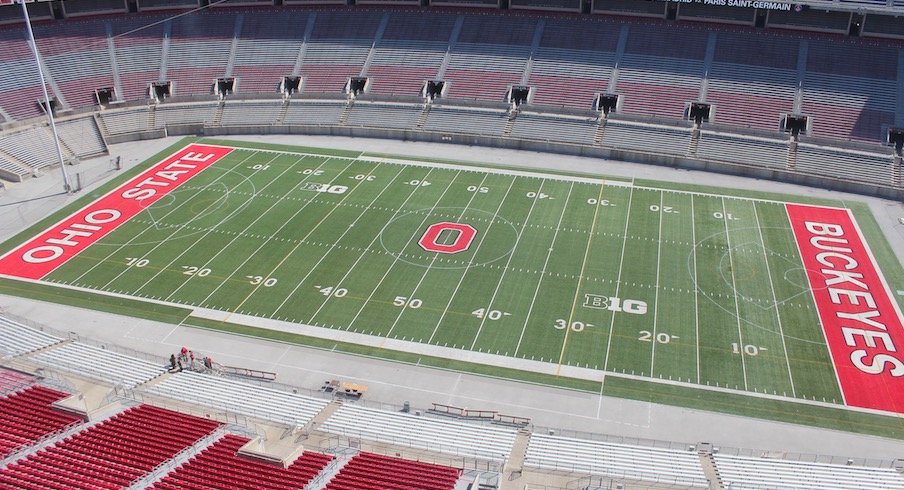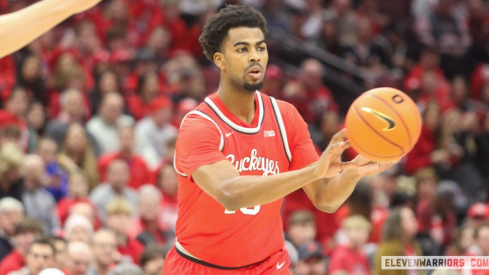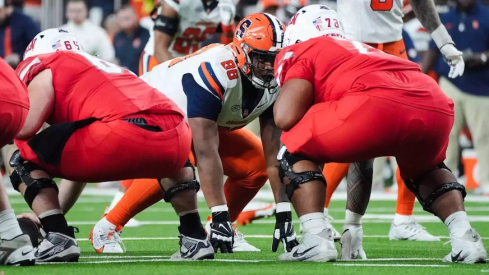Ryan Day had reason to feel excited about Ohio State's 17-player 2019 class, which was ranked No. 14 overall with the third-highest average player rating in the country, on National Signing Day.
But when he and his staff wanted to shift their focus to the 2020 class, they had to wait a couple of weeks to get up to full speed. Due to the NCAA's additional punishment for a self-reported NCAA violation stemming from seven impermissible phone calls made between March 2017 and June 2018, nobody on Ohio State’s staff could talk to any prospects on the phone between Feb. 6 and 18.
That was one of the 22 NCAA violations Ohio State's football and men's basketball programs self-reported between May 1, 2017 and May 22, 2019. The athletic department reported 16 football violations and six men's basketball violations during the two-year period.
The violations, which spanned from serious to absurd, were obtained by Eleven Warriors through several public records requests. The most recent request was fulfilled by the university on Monday.
Most of the self-reported incidents constituted minor violations with minimal punishments. In response to each self-reported violation, the program handed out a self-imposed punishment. In all but four instances, the NCAA determined it did not need to increase or alter the punishments handed out by Ohio State.
The most noteworthy violations in the past two years included the following:
- The football team went over its scholarship limit in the spring of 2017 due to the compliance department telling the football program it could have three players split two scholarships. As a result, the program had a one-scholarship reduction at the “next available opportunity.”
- The football team agreed to no longer recruit five-star Micah Parsons after he took pictures on the College GameDay set and met with the analysts.
- The Agonis Club restructured its organization to meet Ohio State's booster policies.
- Due to the NCAA violations that stemmed from seven impermissible phone calls, Urban Meyer was barred from making recruiting calls from Dec. 20 to 26. Of course, by then, he had already announced his retirement and was no longer leading Ohio State's recruiting efforts.
Here's a summary of each of the 22 self-reported NCAA violations.
Football
Impermissible Text Messages – Reported on March 4, 2019
Defensive line coach Larry Johnson “mistakenly believed” a 2021 prospect was in the 2020 class, and he sent the recruit a text message on Jan. 12. Another person, whose name is redacted, also “mistakenly believed”" a 2021 prospect was in the 2020 class and sent a text message on Jan. 24.
As part of Ohio State's self-imposed punishment, Johnson and the unnamed person were unable to send text messages to any recruits from Jan. 28 to Feb. 3. Additionally, nobody from the university will be allowed to send text messages to the unnamed prospect from Sept. 1 to Sept. 13, the beginning of when teams are allowed to contact 2021 prospects.
Impermissible Phone Calls – Reported on Dec. 19, 2018
Ohio State self-reported seven impermissible calls to recruits, which took place between March 2017 and June 2018.
The violations and self-imposed punishments for each offender included the following:
- Urban Meyer made two calls in a week to a recruit in September 2017 instead of the allotted one call. His punishment entailed not being allowed to make recruiting calls from Dec. 20-26.
- On three occasions in the fall of 2017, an assistant coach made two calls in a week instead of the one call he was allowed to make per week. When the violation was reported, the coach no longer worked for Ohio State, so an unidentified assistant coach was barred from making recruiting calls from Dec. 20-26.
- An assistant coach called a junior in high school in October 2017 when he wasn't allowed to contact the prospect. Thus, the coach was not allowed to make recruiting calls from Dec. 20-26, and the program was not allowed to contact the recruit from Dec. 20 to Jan. 2.
- A non-coaching staff member called a recruit in March 2017, which is against NCAA rules outside of specific circumstances. As a punishment, Ohio State banned anybody from the university from contacting the recruit from Dec. 20 to Jan. 2.
- An assistant coach called a prospect in June 2018 during a period in which he was not allowed. In response, the coach wasn't allowed to make recruiting calls from Dec. 20-26, and nobody from the program could contact the recruit from Dec. 20 to Jan. 2.
The NCAA did not think Ohio State's punishments were harsh enough, so it banned the entire coaching staff from making calls to recruits from Feb. 6-18.
Impermissible Promotion – Reported on Nov. 27, 2018
In a heavily redacted violation, a football player was tagged in a tweet that included photographs of three football players, which he then retweeted. The retweet constituted an NCAA violation, which Ohio State reported. The unnamed football player inadvertently thought he was allowed to retweet the tweet due to a relationship with the person who tweeted the photos that is redacted from the report given to Eleven Warriors.
As a self-imposed punishment, Ohio State deemed the football player ineligible “until reinstated by the NCAA.” The football player “removed the retweet” from his Twitter account. Also, the university sent a cease-and-desist letter to the person that sent the tweet, telling them to “remove the student-athlete's name, image, and likeness from any commercial promotions.”
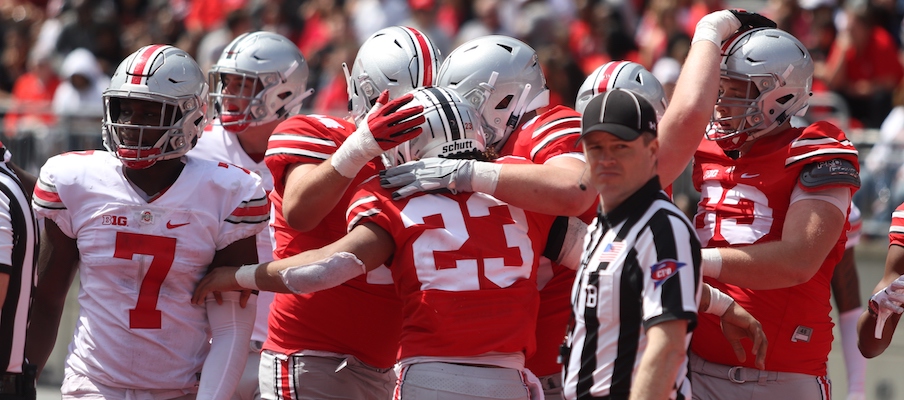
Preferential Treatment – Reported on Oct. 31, 2018
A football player received “one night of lodging,” along with something else that Ohio State redacted from the public record, from a “friend.” However, per the records, “the relationship did not meet the preexisting relationship test,” deeming the player received preferential treatment.
As a self-imposed punishment, Ohio State will develop a plan to track potential issues with preferential treatment and extra benefits, especially during bye weeks and vacation periods.
Recruiting Exam – Reported on Oct. 10, 2018
A football graduate assistant was allowed to work four off-campus camps at other universities during the summer of 2018 prior to passing the 2017-18 NCAA recruiting exam. Ohio State's associate athletic director for compliance mistakenly thought the graduate assistant had passed the test, per the records.
As a self-imposed punishment, Ohio State provided education about camp employment at other universities.
Student-Athlete Reinstatement – Reported on Aug. 29, 2018
The football recruiting staff took prospects and prospects' families somewhere that had a “food/entertainment combo package.” The staff members did not reduce the amount of “host money” given to prospects and their families to account for the food and entertainment package. Therefore, the prospects received more money than allotted, constituting a Level III NCAA violation.
As part of the self-punishment, eight prospects paid the “value of the benefit” to a charity of their choice.
Impermissible Publicity – Reported on May 9, 2018
The night Ohio State arrived in Texas for the Cotton Bowl, a graduate manager watching a Texas high school football playoff game from the hospitality room of the team hotel tweeted a compliment to the bowl committee. The tweet included information about the state championship game, which signified the player Ohio State was recruiting – presumably, Garrett Wilson – and constituted a violation.
Due to the violation, Ohio State did not allow its staff to contact the recruit from Feb. 7 to Feb. 21.
Promotion Using Student-Athlete Image – Reported on May 9, 2018
Using Urban Meyer's Twitter account, Ohio State posted photos of players wearing Lebron James-branded Nike gear. It included the caption, “The @KingJames gear is looking good on the Buckeyes as we land in Bloomington!”
As a self-imposed punishment, Ohio State provided education to the digital media staff and coaches about promoting student-athletes.
Impermissible Publicity and Inducement – Reported on Sept. 26, 2017
In a previously reported incident, Ohio State self-reported an NCAA violation involving five-star prospect Micah Parsons taking photos with College GameDay hosts and analysts on ESPN's set.
Ohio State agreed to no longer recruit Parsons as part of the self-imposed punishment. It also suspended recruiting assistant Ed Terwilliger one game and prohibited all athletic programs from “being in the vicinity” of College GameDay for the rest of the 2017-18 academic calendar.

Impermissible Tweet – Reported on Set. 14, 2017
Assistant coach Kevin Wilson quoted the tweet of a 2018 prospect on July 18, 2017, typing, “It's a great day to be a Buckeye.” Per the records, Wilson mistakenly used the quote tweet feature instead of creating a new tweet. Wilson likely quote tweeted the tweet of tight end Jeremy Ruckert, who committed on July 17, 2017, one day before Wilson's tweet.
In response to the violation, Ohio State did not allow “general and electronic correspondence” with the prospect between Sept. 6-19 in 2017.
Impermissible Electronic Correspondence – Reported on Sept. 14, 2017
Former linebackers coach Billy Davis responded to a text message from a 2019 recruit on Aug. 2, 2017, when he was only allowed to contact 2018 prospects. A week after sending the message, a graduate assistant found the mistake while reviewing Davis' texts.
Ohio State's self-imposed punishment included prohibiting “general and electronic correspondence” from anybody within the program to the prospect between Sept. 1 and 14 in 2017.
Impermissible Text Messages – Reported on July 15, 2017
Meyer and running backs coach Tony Alford each received more than 80 text messages on June 20, 2017 that wished them Happy Father's Day. Both coaches responded to a text from a 2019 recruit, and even though the content of the message was deemed non-recruiting, it was a violation.
As part of the self-imposed punishment, the coaching staff was barred from contacting the prospect via “general or electronic correspondence” from Sept. 1 to Sept. 15 in 2017. The NCAA did not think the punishment was steep enough, referencing the “2-for-1 penalty,” and barred contact with the recruit for an additional two-week period.
Ohio State also created a rule that required coaches to update their contact lists to designate which prospects were pre-contactable.
Use of Name/Image/Likeness – Reported on July 15, 2017
A pair of football players created a strength training company that featured their names and pictures on a website that launched on May 30, 2017. One player made $60 in profits, and the other player did not make any money from the business. The players did not reference their affiliation to Ohio State on the website. However, since they advertised the business using their name and images, the program self-reported a violation.
As part of the self-imposed punishment, the player who made $60 had to pay that amount to a charity of his choice.
Use of Outside Consultant – Reported on July 15, 2017
Two football players worked on foot drills with an “outside consultant” in January 2017. The workouts both took place at and away from Ohio State's facilities. Another player used the consultant in May 2017, using the program's facilities. All three players paid the “going rate” for the workout. The program self-reported a violation for using a consultant on university's campus.
In response, Ohio State provided education about the use of outside consultants to its players. It also gave the consultant an “educational session” about NCAA rules.
Big Ten tender filing deadline – Reported on July 12, 2017
Two early enrollees didn't sign their Big Ten Tenders of Financial Aid until Jan. 11, 2017, two days after classes began. Ohio State had already sent out the Big Ten tenders of the early enrollees and made, per the records, an “administrative error” by not sending the tenders of the two players by the 14-day filing deadline.
Due to the NCAA violation, the compliance office planned to review the Big Ten's initial tender filing deadlines.
Financial Aid Overage – Reported on May 25, 2017
Due to incorrect advice from a member of the compliance department, Ohio State was over its scholarship limit by one-half of a scholarship during the spring academic term of 2017.
A staff member in the compliance department told the football program it could split two scholarships among three players by having two players reimburse one-third of the third player's scholarship. Effectively, they would all be on two-thirds of a scholarship and owe one-third of tuition to the school. The compliance department told the football program that was allowable if the institution was not involved. Nobody from the program followed up with any questions.
That practice was an NCAA violation because Ohio State went over its scholarship limit. The program self-reported the violation later that spring.
As part of the self-imposed punishment, Ohio State reduced its scholarship limit from 85 to 84 at the “next available opportunity.” The director of player personnel, Mark Pantoni, received a letter of admonishment from the university “emphasizing his responsibility to ask for clarification interpretations, specifically when the interpretations can be broadly construed.”
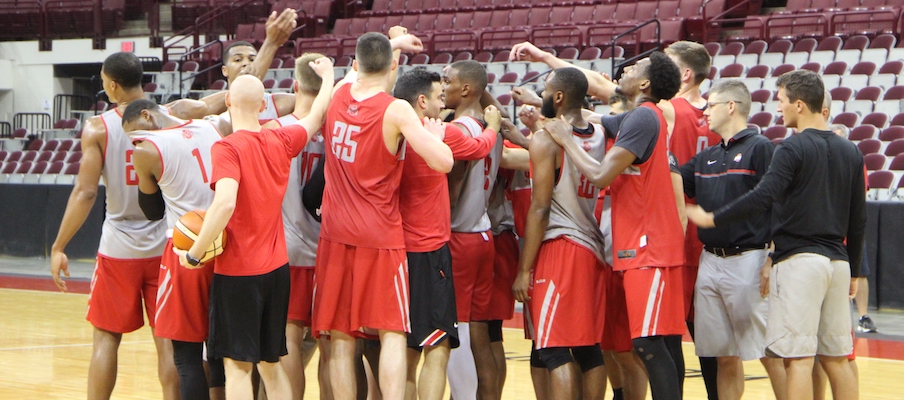
Men's basketball
Impermissible Tryout – Reported on Nov. 26, 2018
An Ohio State basketball player worked out with an outside trainer at an off-campus site and only paid $25 instead of the typical $50 fee. Another player worked out with the outside trainer three weeks later at the program's facility, and he was not charged for his session. Prior to that workout, an Ohio State assistant coach walked into the gym “to say hello” and left after less than five minutes. A video staff member filmed the workout.
As part of Ohio State's self-imposed punishment, both players were deemed ineligible until they paid the trainer in full for their workouts. The trainer, who had posted about the workouts on social media, took down the posts and was banned from using the program's facilities to train anybody but former players.
The NCAA tacked on an additional penalty, decreasing the “countable athletically related activities” by 30 minutes for both the player who worked out on campus and the assistant coach who greeted him.
Free Camp Admission – Reported on Oct. 12, 2018
A “prospect-aged individual and his brother” received free admission to a camp after a former Ohio State player contacted the program to ask about discounts. Since the participants weren't yet in ninth grade, the camp office offered free entry. However, the NCAA considers anybody in seventh grade or above to be a “prospect.”
Due to the violation, part of Ohio State's self-imposed violation included deeming the two camp participants ineligible and requiring each to pay $385 – the cost of the camp – to regain their eligibility.
Recruiting Inducement – Reported on May 11, 2018
A basketball recruit, while on an unofficial visit, had access to a suite at Ohio Stadium for “approximately five minutes” during a football game. His girlfriend's father had invited the prospect to the suite and, despite not having access, was allowed entry for a few minutes before leaving. The recruit had been in the suite with his girlfriend's father “on other occasions,” but none had happened while on a recruiting visit.
Due to the violation, Ohio State provided “in-person education” to the coaching staff about suite access. The NCAA, though, did not agree with the punishment, adding that the prospect was deemed ineligible “until the value of the impermissible benefit is repaid.” The records do not show the monetary sum the recruit had to pay.
Impermissible Booster Group – Reported on May 3, 2018
During an internal audit in the fall of 2017, Ohio State's compliance department discovered the basketball program had conducted an annual fundraising event with the Agonis Club, a local organization.
The profits of the event were split between the Agonis Club and the basketball program. Tickets to in-season practices, a silent auction and meet-and-greets with coaches and players were among the prizes the public could win. During the review, the compliance staff members also found that the Agonis Club had donated money and endowed a scholarship several years prior. Ohio State included the Agonis Club's donations in financial data it submitted to the NCAA, but it did not have an independent accountant verify the Agonis Club's financial data, per the public records.
Due to the NCAA violation, the Agonis Club agreed to restructure its organization in order to “comply with Ohio State's booster policies.”
Impermissible Publicity and Inducement – Reported on Nov. 16, 2017
Three recruits on a campus tour walked onto the set of College GameDay and met Kirk Herbstreit and Eddie George, along with two other ESPN analysts. The previously reported incident took place on the same day and in the same location as the football team's violation that led it to stop recruiting Parsons.
Ohio State's self-imposed punishment included banning all teams from the vicinity of the College GameDay set for the remainder of the academic year and providing education to ESPN producers working on the show.
Impermissible Meals on Official Visits – Reported on July 7, 2017
During a recruit's official visit, the coaching staff ordered a meal that exceeded the program's meal policy by $40. Then, the staff ordered alcohol from a hotel bar for the prospect's family, exceeding Ohio State's beverage policy by $23.25.
Ohio State responded by sending a letter of education to the whole coaching staff about "providing meals and drinks to prospective student-athletes and their parents."
